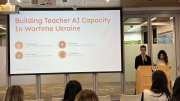President Drew Faust delivered her Jefferson Lecture, "Telling War Stories," sponsored by the National Endowment for the Humanities, Monday evening in Washington, D.C. Drawing on her work as a Civil War historian, she spoke about war as a human narrative for organized violence, and its resonances in history and in literature. What she could not have imagined when preparing the address is that her remarks would be framed so vividly by a signal narrative point in the American "Global War on Terrorism," following President Barack Obama's announcement late Sunday night that Osama bin Laden had been killed in Pakistan.
As the online daily Inside Higher Ed reported,
…in attempting to impose an articulable structure on the ineffable experience of war, Faust argued, we lend it a significance and even a grandeur that belie the nebulous and devastating reality. "To rename violence as war," Faust said, "is to give it a teleology. This is why it can provide the satisfaction of meaning to its participants; this too is why it offers such a natural attraction to writers and historians. War assumes a trajectory towards victory and thus the possibility of its own cessation and conclusion."
It was around this point in her speech that Faust's words took on an almost eerie—albeit coincidental—echo of the events currently making breathless headlines around the world. "When the United States invaded Iraq in 2003," Faust said, "it was influenced in no small part by the desire—even need—to transform the uncertainty of combating a terrorist enemy without a face or location into a conflict that could provide a purposeful, coherent, and understandable structure—a comprehensible narrative. Responding to terrorism with war… offered the United States the sense of intention, the goal-directedness and lure of efficacy that war promises and terrorism obliterates.…The language of war made Americans protagonists in a story they understood rather than the victims or potential victims of forces beyond their comprehension or control."
Those in the audience who'd been following the news (that is to say, probably everyone) were likely to see obvious parallels between Faust's assessment and the media narratives emerging out of the U.S. raid that killed bin Laden. Indeed, President Obama offered just the sort of meaning and teleology to which Faust referred in his remarks to the nation late Sunday: "[T]onight, we are once again reminded that America can do whatever we set our mind to. That is the story of our history, whether it's the pursuit of prosperity for our people, or the struggle for equality for all our citizens; our commitment to stand up for our values abroad, and our sacrifices to make the world a safer place."
The Chronicle of Higher Education's online daily echoed a similar point, noting, "The day Ms. Faust delivered her lecture, the news media was full of reports of the death of Osama bin Laden, the head of Al Qaeda, in a U.S. military operation in Pakistan. Although she wrote the talk well before the news broke, the sense that a chapter in the war on terror has been closed gave the historian's remarks about war story lines an unexpected resonance."








